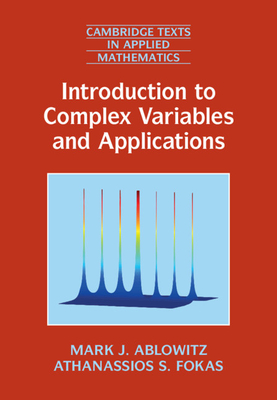An Invitation to Modern Number Theory (Hardcover) (書側有些許黴斑,不影響閱讀 不介意再下單)
暫譯: 現代數論入門 (精裝版)
Steven J. Miller, Ramin Takloo-Bighash
- 出版商: Princeton University
- 出版日期: 2006-03-26
- 售價: $1,280
- 貴賓價: 9.8 折 $1,254
- 語言: 英文
- 頁數: 519
- 裝訂: Hardcover
- ISBN: 0691120609
- ISBN-13: 9780691120607
-
相關分類:
離散數學 Discrete-mathematics
下單後立即進貨 (約5~7天)
買這商品的人也買了...
-
 Statistical Mechanics: Algorithms and Computations (Paperback)
Statistical Mechanics: Algorithms and Computations (Paperback)$1,200$1,176 -
 數學女孩─費馬最後定理
數學女孩─費馬最後定理$340$289 -
 數學女孩 ─ 哥德爾不完備定理
數學女孩 ─ 哥德爾不完備定理$399$339 -
 Simple Models of Magnetism (Paperback)
Simple Models of Magnetism (Paperback)$1,100$1,078 -
 數學女孩─隨機演算法
數學女孩─隨機演算法$450$382 -
 Synchronization Techniques for Digital Receivers (Hardcover)
Synchronization Techniques for Digital Receivers (Hardcover)$15,180$14,876 -
 數學女孩─伽羅瓦理論
數學女孩─伽羅瓦理論$399$339 -
 Computer Age Statistical Inference : Algorithms, Evidence, and Data Science (Hardocver)
Computer Age Statistical Inference : Algorithms, Evidence, and Data Science (Hardocver)$2,980$2,920 -
 Gravitation (Hardcover)
Gravitation (Hardcover)$2,500$2,450 -
 Random Measures, Theory and Applications
Random Measures, Theory and Applications$7,360$7,212 -
 $374程序員數學從零開始
$374程序員數學從零開始 -
 Small Unmanned Aircraft: Theory and Practice
Small Unmanned Aircraft: Theory and Practice$6,500$6,370 -
 $555貝葉斯的博弈 : 數學、思維與人工智能
$555貝葉斯的博弈 : 數學、思維與人工智能 -
 Introduction to Complex Variables and Applications (Paperback)
Introduction to Complex Variables and Applications (Paperback)$1,480$1,450 -
 Statistical Mechanics : Entropy, Order Parameters, and Complexity, 2/e (Paperback)
Statistical Mechanics : Entropy, Order Parameters, and Complexity, 2/e (Paperback)$2,370$2,251 -
 數學女孩
數學女孩$420$357 -
 微電子學, 3/e (上冊) (Razavi: Fundamentals of Microelectronics : With Robotics And Bioengineering Applications, 3/e)
微電子學, 3/e (上冊) (Razavi: Fundamentals of Microelectronics : With Robotics And Bioengineering Applications, 3/e)$720$705 -
 麥肯錫最強問題解決法:傳說中麥肯錫內部最熱門資料大公開,7步驟解決人生所有難題
麥肯錫最強問題解決法:傳說中麥肯錫內部最熱門資料大公開,7步驟解決人生所有難題$450$382 -
 Math for Security: From Graphs and Geometry to Spatial Analysis (Paperback)
Math for Security: From Graphs and Geometry to Spatial Analysis (Paperback)$1,800$1,710 -
 數學女孩 龐加萊猜想
數學女孩 龐加萊猜想$450$382 -
 微電子學, 3/e (下冊) (Razavi: Fundamentals of Microelectronics : With Robotics And Bioengineering Applications, 3/e)
微電子學, 3/e (下冊) (Razavi: Fundamentals of Microelectronics : With Robotics And Bioengineering Applications, 3/e)$760$744 -
 生成深度學習|訓練機器繪畫、寫作、作曲與玩遊戲, 2/e (Generative Deep Learning: Teaching Machines to Paint, Write, Compose, and Play, 2/e)
生成深度學習|訓練機器繪畫、寫作、作曲與玩遊戲, 2/e (Generative Deep Learning: Teaching Machines to Paint, Write, Compose, and Play, 2/e)$880$695 -
 The Language of Mathematics: The Stories Behind the Symbols (Hardcover)
The Language of Mathematics: The Stories Behind the Symbols (Hardcover)$1,100$1,078 -
 Genius at Play: The Curious Mind of John Horton Conway (Paperback)
Genius at Play: The Curious Mind of John Horton Conway (Paperback)$1,340$1,313 -
 Fashion, Faith, and Fantasy in the New Physics of the Universe (Paperback)
Fashion, Faith, and Fantasy in the New Physics of the Universe (Paperback)$980$960
相關主題
商品描述
Description
In a manner accessible to beginning undergraduates, An Invitation to Modern Number Theory introduces many of the central problems, conjectures, results, and techniques of the field, such as the Riemann Hypothesis, Roth's Theorem, the Circle Method, and Random Matrix Theory. Showing how experiments are used to test conjectures and prove theorems, the book allows students to do original work on such problems, often using little more than calculus (though there are numerous remarks for those with deeper backgrounds). It shows students what number theory theorems are used for and what led to them and suggests problems for further research.
Steven Miller and Ramin Takloo-Bighash introduce the problems and the computational skills required to numerically investigate them, providing background material (from probability to statistics to Fourier analysis) whenever necessary. They guide students through a variety of problems, ranging from basic number theory, cryptography, and Goldbach's Problem, to the algebraic structures of numbers and continued fractions, showing connections between these subjects and encouraging students to study them further. In addition, this is the first undergraduate book to explore Random Matrix Theory, which has recently become a powerful tool for predicting answers in number theory.
Providing exercises, references to the background literature, and Web links to previous student research projects, An Invitation to Modern Number Theory can be used to teach a research seminar or a lecture class.
Table Of Contents
Foreword xi
Preface xiii
Notation xixPART 1. BASIC NUMBER THEORY 1
Chapter 1. Mod p Arithmetic, Group Theory and Cryptography 3
Chapter 2. Arithmetic Functions 29
Chapter 3. Zeta and L-Functions 47
Chapter 4. Solutions to Diophantine Equations 81PART 2. CONTINUED FRACTIONS AND APPROXIMATIONS 107
Chapter 5. Algebraic and Transcendental Numbers 109
Chapter 6. The Proof of Roth's Theorem 137
Chapter 7. Introduction to Continued Fractions 158PART 3. PROBABILISTIC METHODS AND EQUIDISTRIBUTION 189
Chapter 8. Introduction to Probability 191
Chapter 9. Applications of Probability: Benford's Law and Hypothesis Testing 216
Chapter 10. Distribution of Digits of Continued Fractions 231
Chapter 11. Introduction to Fourier Analysis 255
Chapter 12. f n k g and Poissonian Behavior 278PART 4. THE CIRCLE METHOD 301
Chapter 13. Introduction to the Circle Method 303
Chapter 14. Circle Method: Heuristics for Germain Primes 326PART 5. RANDOM MATRIX THEORY AND L-FUNCTIONS 357
Chapter 15. From Nuclear Physics to L-Functions 359
Chapter 16. Random Matrix Theory: Eigenvalue Densities 391
Chapter 17. Random Matrix Theory: Spacings between Adjacent Eigenvalues 405
Chapter 18. The Explicit Formula and Density Conjectures 421Appendix A. Analysis Review 439
Appendix B. Linear Algebra Review 455
Appendix C. Hints and Remarks on the Exercises 463
Appendix D. Concluding Remarks 475Bibliography 476
Index 497
商品描述(中文翻譯)
描述
以初學者易於理解的方式,《現代數論的邀請》介紹了該領域的許多核心問題、猜想、結果和技術,例如黎曼猜想、羅斯定理、圓周法和隨機矩陣理論。書中展示了如何利用實驗來檢驗猜想和證明定理,讓學生能夠在這些問題上進行原創性工作,通常只需使用微積分(雖然對於有更深背景的讀者有許多附註)。它向學生展示了數論定理的應用及其背後的推導過程,並提出進一步研究的問題。
史蒂文·米勒(Steven Miller)和拉敏·塔克盧-比哈什(Ramin Takloo-Bighash)介紹了數值調查這些問題所需的問題和計算技能,並在必要時提供背景材料(從概率到統計再到傅立葉分析)。他們引導學生解決各種問題,從基本數論、密碼學和哥德巴赫猜想,到數字的代數結構和連分數,展示這些主題之間的聯繫,並鼓勵學生進一步研究。此外,這是第一本探索隨機矩陣理論的本科書籍,該理論最近已成為預測數論答案的強大工具。
《現代數論的邀請》提供練習題、背景文獻的參考以及先前學生研究項目的網絡連結,可用於教授研究研討會或講座課程。
目錄
前言 xi
序言 xiii
符號 xix
第一部分 基本數論 1
第1章 模p算術、群論與密碼學 3
第2章 算術函數 29
第3章 ζ函數與L函數 47
第4章 迪奧方廷方程的解 81
第二部分 連分數與近似 107
第5章 代數數與超越數 109
第6章 羅斯定理的證明 137
第7章 連分數簡介 158
第三部分 機率方法與均勻分佈 189
第8章 機率簡介 191
第9章 機率的應用:本福德定律與假設檢驗 216
第10章 連分數的數字分佈 231
第11章 傅立葉分析簡介 255
第12章 f n k g 與泊松行為 278
第四部分 圓周法 301
第13章 圓周法簡介 303
第14章 圓周法:對於Germain質數的啟發 326
第五部分 隨機矩陣理論與L函數 357
第15章 從核物理到L函數 359
第16章 隨機矩陣理論:特徵值密度 391
第17章 隨機矩陣理論:相鄰特徵值之間的間距 405
第18章 顯式公式與密度猜想 421
附錄A 分析回顧 439
附錄B 線性代數回顧 455
附錄C 練習題的提示與註解 463
附錄D 結論性註解 475
參考文獻 476
索引 497











